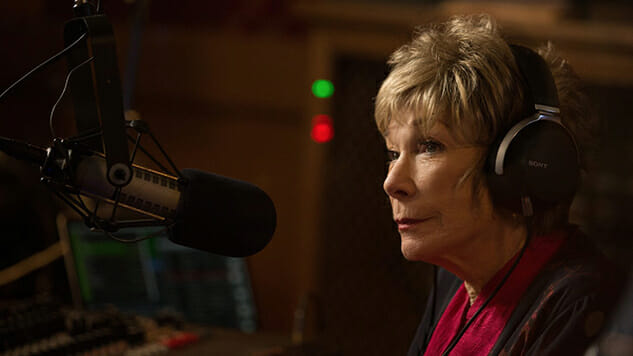Shirley MacLaine has worked with a lot of great directors in her career—Vincente Minnelli, Billy Wilder, Mike Nichols, Hal Ashby, and Richard Linklater, just to name a handful—but she’s maybe never had a director who’s understood and celebrated her talents the way that Mark Pellington does in The Last Word. Pellington explores and builds upon MacLaine’s persona the way that John Ford did with John Wayne in The Searchers, or Clint Eastwood did with himself in Gran Torino: Her work in The Last Word recalls and comments upon films like The Apartment, Terms of Endearment and Postcards From the Edge—then goes deeper.
Yet, there’s nothing intellectualized or contrived about MacLaine’s performance; the history of her past work informs how we see her here and adds dimension to the character, but the character itself is a fully realized creation MacLaine inhabits with wit, passion, rage and contemplation. She and Pellington play off of our expectations based on decades of watching MacLaine play powerful, cheeky women, and then use those expectations as a sort of shorthand: We feel that we know who this person is within the first few shots, which ultimately allows the film to dig deeper into MacLaine’s persona, exposing both more vulnerability and more strength than she’s ever exhibited on screen before.
MacLaine is Harriet, a control freak so intent on micromanaging everything and everyone around her that she even wants to supervise the writing of her own obituary. Impressed by the way that local newspaper writer Anne (Amanda Seyfried) memorializes people she’s never met, Harriet hires the young reporter to write her obituary while she’s still alive so that she can approve it. When Anne can’t find anyone with a good word to say about the combative woman—even her priest badmouths her—Harriet decides to refurbish her image while there’s still time, taking Anne along to record the transformation. In Stuart Ross Fink’s beautifully calibrated script, this leads to a series of comic and dramatic developments that intertwine with increasingly affecting and often hilarious results: Harriet mentors a foul-mouthed nine-year old (Ann’Jewel Lee), reconnects with her estranged daughter (Anne Heche) and ex-husband (Philip Baker Hall), and takes on a new job as a disc jockey, all while trying to help Anne with her love life.
Fink and Pellington keep all the balls in the air, expertly balancing the various storylines as well as the numerous tonal shifts that recall MacLaine’s best work with Wilder on films like The Apartment. One of the many remarkable things about The Last Word is that MacLaine is surrounded by actors who hold their own in the midst of her towering performance: Everyone from Seyfried on down nails the delicate mix of comedy and poignancy, and the generosity that the actors continually show each other gives the film an infectious sense of empathy even when the characters are hardly on their best behavior.
As good as everyone is, though, make no mistake about it: This is MacLaine’s movie. Her performance combines the plucky humor and vulnerability of her early work (The Trouble with Harry, Some Came Running) with the steely self-assurance of her turns in Terms of Endearment and Postcards From the Edge, but there’s something more here—a profound meditation on the transience of existence and the value of what we leave behind. The depth of MacLaine’s performance and Fink and Pellington’s commentary is in no way compromised by the fact that for the most part The Last Word is a comedy that makes its points lightly. To the contrary, the film’s entertaining surface allows the weight of the material to sneak up on the viewer.
The Last Word is as much a testament film for its director as it is for its star, summarizing and synthesizing the concerns of Pellington’s previous films while simultaneously striking out in new directions. In work as diverse as The Mothman Prophecies (a thriller in which Richard Gere plays a character who becomes obsessed with the supernatural ramifications of his wife’s death), Father’s Daze (a documentary about his father’s struggle with Alzheimer’s Disease) and Of Time and Memory (an unconventional adaptation of Don Snyder’s novel about Snyder’s attempts to know his deceased mother), Pellington has long been interested in the connections between mortality, memory and identity. In his last couple features, Henry Poole is Here and the underrated I Melt With You, Pellington approached these themes from a male point of view—a somewhat acidic one in the case of the latter film. In Fink’s script for The Last Word, Pellington finds the right vehicle to explore his preoccupations through a new lens, and addressing the issues through female characters has reinvigorated his technique. His direction has a newfound purity here, as his precise but unforced compositions subtly express both the tensions between the characters and the tensions they feel within themselves. There’s no straining for emotional effects, which makes them all the more powerful when they come.
Director: Mark Pellington
Writer: Stuart Ross Fink
Starring: Shirley MacLaine, Amanda Seyfried, Anne Heche, Ann’Jewell Lee, Thomas Sadoski, Tom Everett Scott, Philip Baker Hall
Release Date: March 3, 2017
Jim Hemphill is the writer and director of the award-winning film The Trouble with the Truth, starring Lea Thompson and John Shea. He has written about movies for Filmmaker Magazine, Film Comment and many other publications. You can follow him on Twitter.
